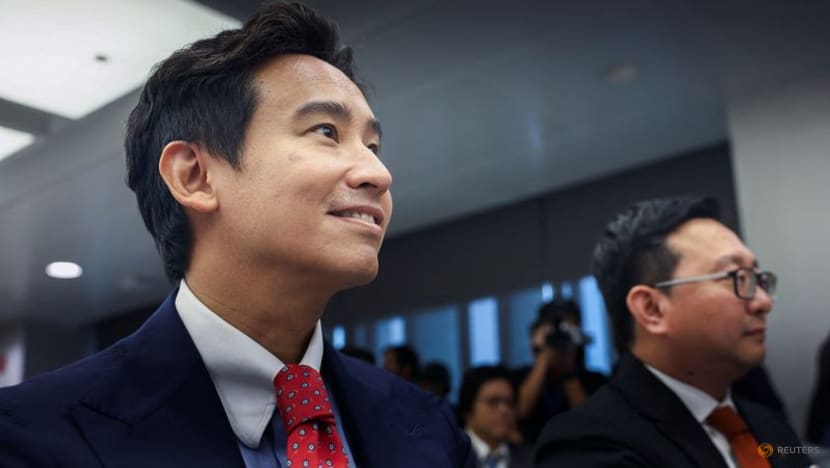CNA Explains: What's next for Thailand's progressive movement, after court ruling against Move Forward Party?
Pita Limjaroenrat's party has been found guilty of trying to overthrow the monarchy and ordered to end its royal reform campaign. Thailand correspondent Saksith Saiyasombut examines the implications.

Former Move Forward Party leader Pita Limjaroenrat reacts to Thailand's Constitutional Court delivering its verdict on his party's bid to amend a law against insulting the monarchy, in Bangkok, Jan 31, 2024. (Photo: Reuters/Chalinee Thirasupa)

This audio is generated by an AI tool.
BANGKOK: Thailand’s Constitutional Court ruled on Wednesday (Jan 31) that the opposition Move Forward Party’s promise during the 2023 election to amend the country’s strict royal insult law was an attempt to overthrow the monarchy.
What's the case about?
The case was filed by a conservative activist lawyer in July last year, right when Move Forward was trying to convert its election victory into the formation of a government coalition. The bid failed and Move Forward remained in the opposition.
The lawyer's petition argued that Move Forward’s campaign promise to amend the lese majeste law was violating Section 49 of the Constitution.
The lese majeste law, also known as Section 112 of Thailand’s criminal code, criminalises insults and threats to the king, queen and heirs with up to 15 years per offence.
But more often than not, past cases have also widened the law's scope to include criticism of past kings and the officially revered monarchy as a whole.
Section 49, meanwhile, forbids anyone from “overthrowing” the constitutional monarchy - and says that anyone who thinks someone is doing so can petition the court to tell would-be offender to stop.
Related:
What's the verdict and why?
The nine judges of the Constitutional Court ruled unanimously against Move Forward.
They said that Move Forward’s pledge to change the lese majeste law and using that to campaign for votes at last year’s election was tantamount to calling for the overthrow of the constitutional monarchy.
A statement by the court said the party’s efforts to change the law “undermines and weakens” the monarchy and was “an intent to separate the monarchy from the Thai nation, which is significantly dangerous to the security of the state”.
As a result, the court ordered Move Forward to “cease any activity” in violation of Section 49 of the Constitution.
In essence, the court was telling Move Forward to cease any public discussion on amending the lese majeste law.
What does this mean for Move Forward?
This does not mean that Move Forward is being disbanded.
That was not the scope of the ruling and what was sought in the original petition against them.
But there could be more trouble for the reformist-progressive platform: The ruling could open a new legal path that does indeed end with a dissolution of Move Forward.
Still, that would require a new petition that would involve the Election Commission - which oversees government elections in Thailand - being prodded into asking the Constitutional Court to disband a party.
And on Wednesday, with the ink on the court verdict barely dry, lawyer and former senator Ruangkrai Leekijwattana - dubbed a "serial petitioner" by local media - said he was preparing to petition the Commission to look into a possible dissolution of Move Forward.
What's next for the party?
Addressing media on Wednesday, Move Forward's leader Chaithawat Tulathon warned that the ruling could make the royal institution increasingly "a factor behind conflicts in Thai politics".
Former party leader Pita Limjaroenrat also bemoaned a “lost opportunity for us to use the parliament to find a consensus for such an important and sensitive issue".
Mr Pita was absolved by the Constitutional Court a week before, in a different case to do with allegations of illegally possessing shares in a media company.
The broadcaster in question, iTV, went off-air in 2007 and therefore couldn't be considered a media company anymore.
The ruling also reinstated him as a member of parliament, where he almost immediately took the opportunity to criticise the government’s flagship cash handout plans.
But the most recent ruling could put Mr Pita and Move Forward's political future in jeopardy yet again.
One only needs to look at what happened to Move Forward's predecessor Future Forward.
In 2020, the Constitutional Court ruled that the latter party's then-leader Thanathorn Juangruanroongkit allegedly violated finance laws. He and the entire executive board were banned from seeking political office for 10 years.
If another attempt to dissolve Move Forward succeeds, it’s expected that the party leadership would be punished the same way.
But generally, party dissolutions have proven to be a blunt, yet ineffective tool.
Thai political parties often have plans in place for remaining lawmakers to carry on under a new banner.
Even the ruling Pheu Thai Party is the third incarnation of the original Thai Rak Thai Party; which has won two elections since a court-ordered dissolution in 2007.
And if Move Forward’s diligent legislative record as an opposition party and its election success in 2023 show one thing, it's that beyond political parties, the popularity of the reformist-progressive platform is no fluke and its trajectory points upwards.
Related:
What does this say about the monarchy and politics in Thailand?
The lese majeste law as we know it today was last updated during the military dictatorships of the 1970s.
Even though it’s not illegal to talk about the law and its countless cases, it's long considered to be a taboo subject.
Yet it has now arrived in the mainstream, in part thanks to Move Forward making it a major campaign issue. There was no debate show during pre-election season where the topic wasn’t discussed - and in lively fashion - with the party's candidates consistently arguing that amending the law wasn’t aimed at toppling the monarchy.
Now, the Wednesday ruling has effectively put a gag order on Move Forward regarding lese majeste.
Those defending the law accuse reformists of trying to overthrow the monarchy; while slightly moderate voices say that a criminal law shouldn’t be politicised.
But critics say that's already the case as the law curtails criticism against the entire Thai power structure, upheld by a symbiotic relationship between powerful elites, the military and a palace that has seen 13 successful coups since 1932.
In 2020, the same year when the Future Forward Party was dissolved, large youth-led protests called for widespread political reforms that also targeted the monarchy and included the abolishment of lese majeste.
The core of their argument was that Thailand would see progress only if all parts of the political system were reformed.
Many of those activists are being charged under exactly that law now: At least 262 people have been charged with lese majeste offences since 2020, according to the legal aid group Thai Lawyers for Human Rights.
In mid-January, one of these activists was sentenced to 50 years in jail for social media posts deemed insulting to the monarchy. This was the highest punishment one has received under the lese majeste law so far.
Wednesday’s verdict has seemingly killed off any chance of amending lese majeste for the foreseeable future. And free speech in Thailand could be affected as red lines could be further muddled by the Constitutional Court’s latest ruling.
Together with the slew of convictions and Move Forward’s confinement to the opposition bench - not to mention the apparent ever-constant threat of dissolution - huge challenges stand in the way of those calling for reform.
Not to mention the prolonged dominance of military-linked political establishment, which now includes its once-enemy Pheu Thai at the top of an uneasy government coalition.
All of which might make it hard for supporters to believe that a progressive party could ever govern Thailand one day.
But that’s what was said after Future Forward’s dissolution four years ago as well.














